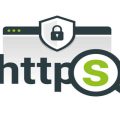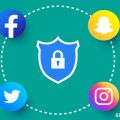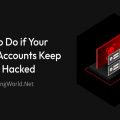Cybersecurity hasn’t been more important as it currently is. As we invest more time on the internet, we are frequently sharing and creating more of our private information. And when this information falls into incorrect hands, financial and private information could be in danger. Therefore, for companies and individuals alike, protecting sensitive information is crucial.
Table of Contents
Why is Cybersecurity Important?
Should you follow tech information, you’ll have discovered a massive center on solitude and cybersecurity recently. The way organizations manage data issues. And regrettably, there were many data breaches in the previous year.In case a data breach impacts your personal information, personal data is no longer confidential. Hackers may have the ability to get their hands on information such as your Social Security number or banking details.
And among the most typical results from data breaches is identity theft. For a company that has undergone a data breach, there are different consequences. Firms are able to eliminate earnings or they might need to pay for increased legal, PR, or insurance expenses. Intellectual property could be jeopardized. And, a data breach may damage a brand’s standing. Whether you’re an individual or a company leader, you have to be protecting your information.
And far better cybersecurity practices can begin with little, individual attempts. Thus, what can you do to keep your information secure and from the wrong hands?
Top 10 Cybersecurity Tips
Here are 12 easy cybersecurity tips for keeping your personal information secure. Don’t forget to share these tips with your employees. That way you can help protect your organization too.
1. Be Cautious of Links
Links in emails are a frequent tool used by hackers to trick people into giving up their protected details. This can be in the shape of banking announcements, flight bookings, password retrieval emails, and much more.
When a user clicks one of those links, they’re taken to a bogus website that appears eerily similar to the real counterpart. The website will request them to log in or enter personal info. After a hacker gets their hands with this info they have access to this consumer’s account.
So, know about the links on your emails. If something seems suspicious, do not click it. Actually, the safest bet would be to pay a visit to a supplier’s site directly rather than using an email connection.
2. Utilize a Password Manager
A password manager is a program or software that keeps all of your passwords in 1 area. You’ve got one”master key” password to unlock access to these passwords. Having a password manager, you will not need to be concerned about remembering all your passwords. Additionally, it will prevent you from needing to write down passwords (that you shouldn’t ever do!)
LastPass, KeePass, Dashlane, 1Password, and Roboform are good programs. Many provide free versions, and a few are free. And, in case you utilize Dropbox, OneDrive, Google Drive, or so on, it is possible to save the password on your own cloud drive and it’ll be available everywhere.
3. Establish Multi-Factor Authentication
With no multi-factor authentication (MFA) setup, an individual may access their accounts with just a password and username. However, MFA adds yet another layer of protection. It takes more than 1 way of authentication to confirm that a consumer’s identity for login.
1 instance of MFA is every time a user logs into a site and has to enter an extra one-time password. This one-time password will often be transmitted to the consumer’s email or telephone. Setting up MFA produces a layered shield, which makes it harder for an unauthorized person to get your own information.
4. Prevent Using Debit Cards Online
One other important cybersecurity suggestion revolves around making payments. Whenever you make an internet payment, then avoid using debit cards. Or anything tied directly to a bank account in reality.
Rather, use choices that provide an excess layer of security between hackers and your bank account. This might be a charge card with insurance or a sort of internet payment system such as PayPal.
5. Don’t Conserve Payment Info
A good deal of sites permits you to store your credit card info to produce potential purchasing quicker and simpler. Do not do it. Breaches occur all of the time. There is nothing to steal in case your credit card is not saved on the website. It might look like a nuisance, but we guarantee that it is not quite as bad as getting your data stolen.
6. Maintain Your Systems Up to Date
Your applications, operating system, and browser must always be current. If your company employs a firewall, your antivirus software and firmware also need to be current. The older a system is, the longer hackers have needed to attempt to locate vulnerabilities. By upgrading your programs, you may protect against hackers or malware from exploiting those safety flaws.
So, the next time you notice that program upgrade pop-up, do not ignore it!
7. Prevent Porn Sites
In this time of social networking, it’s simple to talk about a connection online. However, exercise caution when visiting new websites. It is possible these websites carry”drive-by download strikes ” that may threaten your information.
Using a drive-by download assault, an individual does not have to click anything to their computer to become infected. Just seeing a website is sufficient to pass malicious code. Thus, it’s ideal to adhere to well-established websites you trust and know. Even though these websites can be hacked also, it is less likely.
8. Be Cautious on Social Networking
Social networking is an excellent way to stay in contact with friends and loved ones. However, be conscious of what you’re discussing on the internet. Criminals and hackers can discover a great deal of info about you by detecting your public profile. And like you would not share all of your private information with a stranger, then you should not discuss it all online.
Viruses, malware, spyware, phishing attacks, and much more. There are many ways that your information could be undermined. Installing anti-virus applications on your apparatus will help fight these attacks. Be certain that the program is active and current, and it ought to avoid digital security dangers before they happen.
9. Install Anti-Virus Software
Viruses, malware, spyware, phishing attacks, and much more. There are many ways that your information could be undermined. Installing anti-virus applications on your apparatus will help fight these attacks. Be certain that the program is active and current, and it ought to avoid digital security dangers before they happen.
10. Prevent Unnecessary Downloads
Downloads are a prime strategy hackers use to access a system. To shield your computer and your information, restrict your downloads. Any unnecessary applications or browser extensions must be avoided. And in a business, employees should require consent prior to downloading anything from the web.
If you’ve got a download protected, always opt for a custom install and then observe attentively. If any add-ons or extensions pop up throughout automatic installations, then decline them.








